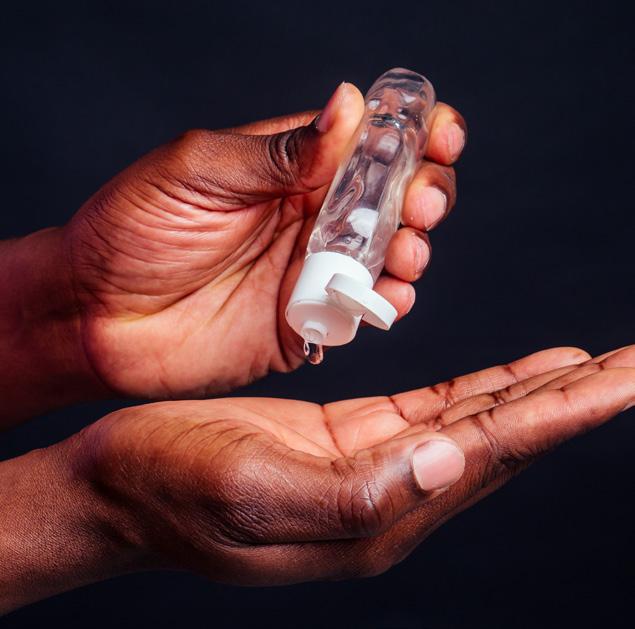
4 minute read
Naturally clean sanitising and disinfectant solutions
Good hygiene practices are a simple, inexpensive and effective way to prevent the spread of infections. With the increasing use of hand-wash products, sanitisers and disinfectants during the COVID-19 pandemic, there is great opportunity for personal care brands to innovate with new marketing strategies and product designs that provide more sensorially pleasing, alcohol-free products. Millchem offers a wide range of effective and innovative ingredients and formulation technologies from its leading international principals, to meet the increased demand for sanitisers and disinfectants during COVID-19.
Antiseptic technology for alcohol-free applications
Benzalkonium chloride (BKC) is a cationic organic quaternary ammonium compound with biocidal properties. It also inhibits growth of microorganisms on the skin and other surfaces.
BKC is a highly water-soluble ingredient; when it is diluted it gets washed off from surfaces and its efficacy is reduced. HydroSal BKC from Salvona is an encapsulated technology designed to achieve better utilisation of BKC. The incorporation of HydroSal BKC technology as a raw material makes it easy to produce finished products that are more skin friendly and totally alcohol free.
HydroSal BKC is comprised of sub-micron spheres approximately 0.1 to 0.3 microns in diameter. These spheres are infused with BKC and form a clear product. The polymeric structure can be suspended in water. When HydroSal BKC is applied on a surface, it forms a thin, invisible film that retains the BKC. The release of BKC is triggered with moisture at the applied area.
Hydrosal BKC is effective immediately upon application and has the potential to protect for longer periods. The extended protection results from the property of the shell, which assembles and locks in the BKC.
It can be used as an active ingredient in many consumer products, including hand sanitisers, wet wipes, skin antiseptics, spray disinfectants for hard surface sanitation, floor cleaners and hard surface disinfectants.

Create clear gel emulsions
The visual effect of transparent cosmetic formulations has great appeal for consumers. It’s easy to obtain transparent gels using polymers, yet for more pleasant sensorial benefits, clear oil-in-water dispersions are generally preferred. Unfortunately, the latter can be challenging to work with for formulators.
The most widely used technique to create a clear oil-in-water dispersion is to prepare microemulsions – thermodynamically stable dispersions with a particle size of roughly 50 nanometers. However, there are several drawbacks to microemulsions. They require high levels of surfactants that can have an irritating effect; they need a cosurfactant that is typically an insoluble polyol and, because they are thin, they should be thickened using a rheology modifier such as a water-soluble polymer.
Hallstar’s unique multifunctional ingredient, Olivem 2020 overcomes these obstacles. By combining Olivem 2020 with Hallstar’s biomimetic water-soluble emollients, Olivem 300 or Florasolvs Macadamia-16, formulators can create transparent, non-irritating water dispersions with a soft, creamy feel and adjustable viscosity.
Olivem 2020 contains the oil phase ethylhexyl olivate, the cosurfactant polyglyceryl-4 olivate and the polymer sodium acrylates copolymer. By adding Olivem 300 or Florasolvs Macadamia-16, which act as solubilisers, it is possible to obtain transparent emulsions.
Approved products effective against COVID-19
As health and safety organisations continue to closely monitor the respiratory disease caused by COVID-19, many brands have asked if Stepan has any US EPA approved registrations eligible for environmental infectious control of the coronavirus under the US EPA’s emerging viral pathogen guidance.
Stepan offers 19 registered end-use formulations, which meet the criteria for applications against emerging viral pathogens. These may be considered for use as hard surface disinfectants against SARS-CoV-2, the novel coronavirus that causes the disease COVID-19.
Stepan’s BTC 2125M products are a combination of two distinct quaternaries, dual-quat, which provide a broad spectrum of bacteriological control at an economical cost. BTC 2125M quats are used in disinfectant, deodoriser and sanitiser formulations for hospitals, nursing homes, public institutions and industry.
BTC quats are compatible with cationics, nonionics and amphoterics at the proper pH range, as well as alkaline and acid inorganics and most mineral and organic acids.
Fragrances for antiseptic gels
Certain savvy skin care brands on the market are already producing effective hand sanitiser gels without the antiseptic aroma, opting for essential oils and aromatic scents instead. This is evident among organic, environmentally friendly hand sanitiser products on the international market, which are said to ‘smell much better than those with a typical antiseptic aroma’.
Sozio offers a great smelling range of fragrances for antiseptic gels to bring unique elements of freshness and fun to hand sanitiser products. The range includes:
• freshness pine with lemon, pine mint and eucalyptus notes
• lavender blossom with eucalyptus, lavender pine and musk notes
• mint and eucalyptus with pine notes
• a floral aqueous bamboo with green notes of bamboo, melon, aquatic and rose
• a fruity green apple scent with apple, freesia, lily of the valley and musk
• a floral aqueous aloe vera with rose, violet and sandalwood
• a floral green aqua cucumber with notes of cucumber, rose, orris and musk
• a citrus grapefruit with rhubarb, blackcurrant and jasmine.








